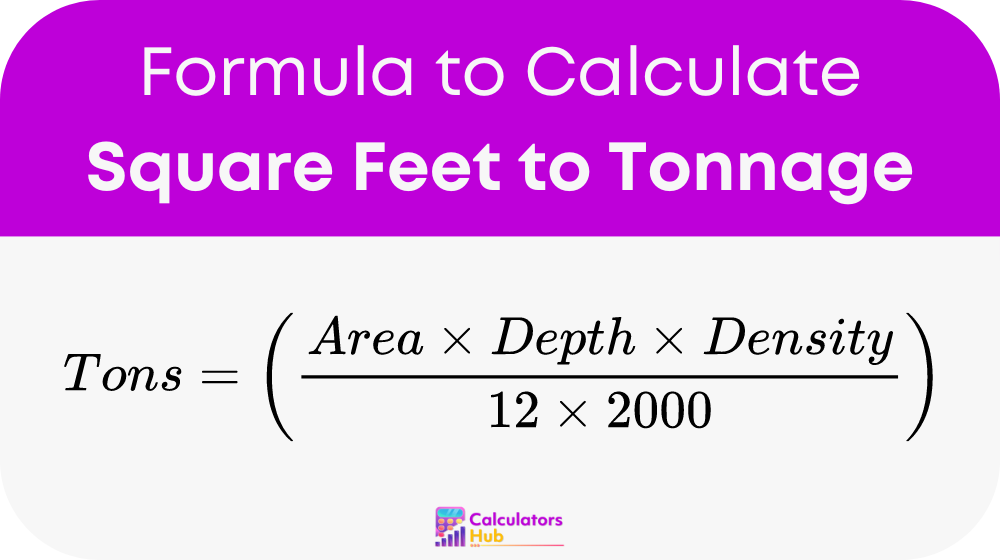The Square Feet to Tonnage Calculator helps you determine the amount of material needed to cover a specific area with a given thickness. By inputting the area, depth, and material density, you can accurately estimate the total weight of the material required in tons. This tool simplifies the calculation process, ensuring accurate and reliable results without the need for manual computation.
Formula of Square Feet to Tonnage Calculator
The formula used by the Square Feet to Tonnage Calculator is straightforward:

Here's what each variable represents:
- Area (A): This is the surface area in square feet you want to cover with the material.
- Depth (D): This is the thickness of the material in inches. You'll need to convert this to feet by dividing by 12.
- Material Density (MD): This is the weight per unit volume of the material, typically given in pounds per cubic foot (lbs/ft³).
- 2000: This is the conversion factor to convert pounds to tons (1 ton = 2000 lbs).
Conversion Table
Here are some pre-calculated values for quick reference:
| Area (sq ft) | Depth (in) | Material Density (lbs/ft³) | Total Tons |
|---|---|---|---|
| 1000 | 1 | 100 | 4.17 |
| 1000 | 2 | 100 | 8.33 |
| 1000 | 3 | 100 | 12.50 |
| 2000 | 1 | 100 | 8.33 |
| 2000 | 2 | 100 | 16.67 |
| 2000 | 3 | 100 | 25.00 |
These values can help you quickly estimate material requirements without performing individual calculations.
Example of Square Feet to Tonnage Calculator
Let's walk through an example to see how the formula works in practice. Suppose you have an area of 1500 square feet, a depth of 2 inches, and the material density is 120 lbs/ft³.
- Convert the depth to feet:
- Depth = 2 inches / 12 = 0.167 feet
- Use the formula:
- Total Tons = (1500 * 0.167) * 120 / 2000
- Calculate the total tons:
- Total Tons = (250.5) * 120 / 2000
- Total Tons = 30060 / 2000
- Total Tons = 15.03
So, you would need approximately 15.03 tons of material.
Most Common FAQs
Material density refers to the weight per unit volume of the material, typically measured in pounds per cubic foot (lbs/ft³). You can find this information from material suppliers, product specifications, or online resources.
The calculator is highly accurate if you provide precise inputs for area, depth, and material density. Always double-check your measurements to ensure accuracy.
Yes, the calculator can be used for any material as long as you know the material's density. Common materials include gravel, sand, mulch, and topsoil.